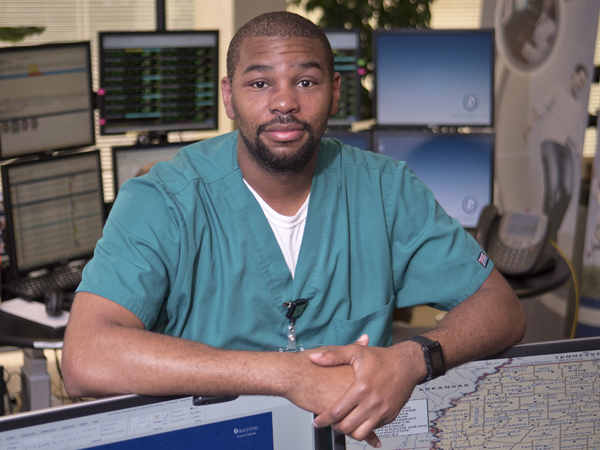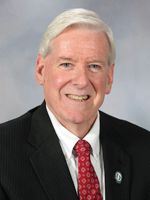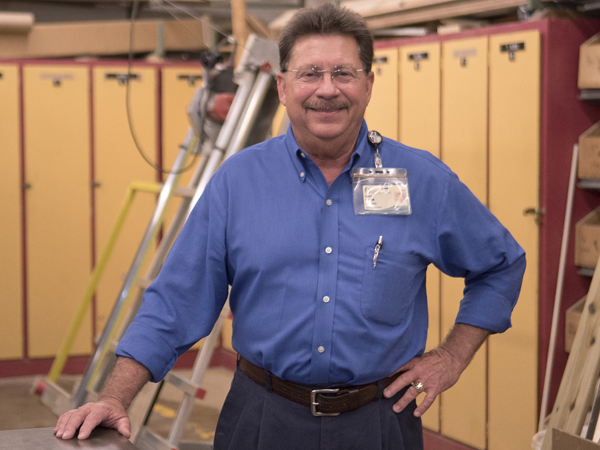Survey seeks employee feedback on workplace engagement, culture of safety

Kourtland Adams has been on both the receiving and giving ends of employee surveys at the University of Mississippi Medical Center.
He took a confidential survey asking employees' perceptions of their workplace after becoming a Medical Center charge nurse in 2010, and his role shifted to the managerial “giving” side during the last survey in 2013. “I have no clue who said what,” Adams said. “I tried to listen to what people were saying and make changes accordingly.”

Adams, a nurse educator in the Center for Telehealth, plans to take the latest survey to be given July 18-31 through the company Press Ganey, a national firm that uses data-driven surveys and a “listen and learn” approach to improve the employee and patient experience.
“One of UMMC's strategic goals is to be an employer of choice,” said Michael Estes, chief human resources officer. “We will use the results of the survey to focus on this at the organizational level - to find things that will help us be an employer of choice and to look at issues and opportunities for this to be a great place to work.”

What's different about the new survey: It will be given UMMC-wide, including all clinics statewide, UMMC Holmes County and UMMC Grenada. And, it will include the Medical Center's culture of safety, asking participants if they feel it's safe to be a patient her and how their jobs impact safety.
“Our employees are the most valuable resource of the institution. Each employee's happiness, safety, and sense of fulfillment are vital elements in determining a person's full productivity and ability to contribute to the important mission of this Medical Center,” said Dr. Charles O'Mara, associate vice chancellor for clinical affairs. “The opinions of all employees are excellent gauges of those vital elements.”
The voluntary survey is divided into two sections, employee engagement and culture of safety. Some employees may wonder, based on their jobs, why they'd be questioned about patient safety.
“All of us have a perception of how safe it is to be a patient here, and it's important for everyone to provide that feedback,” Estes said. “All perceptions are important. We want everyone to have a voice.”
Employees on July 18 will receive an email from Press Ganey that includes a unique link to the survey that takes about 20 minutes. Employees should not forward their email because its unique link can only be used by one person. If an email is forwarded and another person takes the survey, the employee cannot take it themselves.
UMMC managers and administrators won't know who did or did not take part and won't have access to individual survey responses, but they will know how many total employees participated.
It's hoped that all employees will provide valuable feedback by taking the survey, Estes said. Managers are being trained to allow employees adequate time to complete the survey during the work day. “Full participation helps us to be sure to focus on the most important areas,” said Reatha Clark, the Medical Center's chief operating officer for business operations.
Dr. Ralph Didlake, associate vice chancellor for academic affairs and chief academic officer, says taking part in the survey is a “quality improvement opportunity. “Voicing our opinions honestly and collectively can inform strategic decisions, and we shouldn't miss this opportunity,” said Didlake, who with Clark, O'Mara and Estes serves on a 13-person survey steering committee.
One of the biggest reason people don't take employee surveys is “the fear of retaliation and that it won't be confidential,” Estes said. “We signed in our agreement with Press Ganey that we won't ask, and they won't tell. It's not who said it but what was said, that's important.”
Adams said that although he felt comfortable taking previous surveys, “I could tell there were some people who were nervous about it.”
“Some managers in the past didn't know who said what but, unfortunately, have said 'I know who said ....'” Estes said. “They really didn't. We are telling them that it's totally unacceptable for them to use intimidation or fear. This is about getting better.”
Clark agrees. “Protecting the identity of individual respondents is the only way to ensure that we continue to receive honest, complete feedback in years to come.”

Stormy Carr, an administrative assistant II in the School of Health Related Professions, strongly believes in employee surveys - but cautions that unless employees get feedback, they won't feel it's worthwhile to participate again.
“I've found that when we complete them, we never have any feedback,” said Carr, whose knowledge of surveys was bolstered by her recent master's degree in leadership from Belhaven University.
“If you want to do these surveys, then you need to give feedback, whether it's positive or negative. People want to know that they are being heard. That's the purpose. You need to know where the miscommunication is coming from and where the understanding is.”
Some of the UMMC employee suggestions and concerns voiced in previous surveys have been acted upon, including a virtual suggestion box and recognition of employees who do a good job through creation of an awards team. Managers received training on how to fairly treat their employees, and new leadership competencies were developed and included in management evaluations.
The newest survey “shows UMMC's commitment to their employees by trying to make the work environment the best that it can be,” said Andrew Russell, a Children's Miracle Network coordinator. “A lot of time is spent at your job, especially in the medical field, so a healthy work environment is critical.”
“We plan to make sure everyone knows what our overall strengths and overall concerns are. At the department level, that data in the past has been shared,” Estes said. “Employees at the grassroots level will be involved in initiatives that go on to make the Medical Center a better place to work and a safer place for patients.”

Randy Hudson, UMMC's carpentry shop supervisor, said physical facilities asks all who submit a work order to give feedback by clicking on a link and filling out a form. “Was the employee courteous? If they couldn't fix it, did they refer you to someone who could?” he said the questions include.
“You can also write in any comments you want. We see the results, and if it's not good, we contact the requester and ask what we can do to serve them better,” Hudson said.
He believes an organization-wide survey would be good if it's not administered in-house and if it's confidential. “There are some things people might not want to say about their peers.”
Trust that there will be confidentiality. That in itself encourages employees to take the time to do the survey, Carr said. “Have a comments section where people can say things that weren't addressed by the survey,” Adams said. “Ask what the potential needs of employees are.”
Employees will be invited to make their own comments in the survey, Estes said.
Give a token of appreciation for completing the survey, Carr advises. “I do them for Belhaven all the time, and they gave us a free cup holder,” Carr said. “If we throw in an incentive and then mail it to the employee, you'll have more people take part.”
If employees identify with their employer and are involved in the betterment of their workforce, Press Ganey says, they're willing to go above and beyond, are energetic and enthusiastic, more likely to stay, and willing to recommend their organization as a place to work and receive care.
That starts with knowing their input on improvement means something.
“It's been my experience and understanding that in order to be the best and exceed above one's competitors, you should speak to those directly affected and connected to what you are aiming to improve,” said Tonjula Shelby, a registered nurse care coordinator in the Department of Cardiology.
“I'm willing to take the survey,” said Joyce Shelby, manager of finance and administration for the Interprofessional Simulation Education Center. “If I can get feedback and see the results of what the survey told us, then that would make me feel as though I'm actually being heard.
“We have leaders in place, but we're the lay people who do the work. It's important to get our opinions.”


